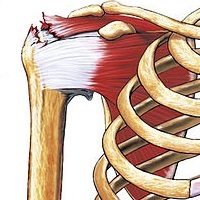
Photo from wikipedia
During disuse-induced muscle atrophy, macrophages play a significant role in inflammatory responses that occur with muscle degeneration and repair. Heat treatment has been shown to alleviate muscle atrophy; however, the… Click to show full abstract
During disuse-induced muscle atrophy, macrophages play a significant role in inflammatory responses that occur with muscle degeneration and repair. Heat treatment has been shown to alleviate muscle atrophy; however, the effect of heat on inflammatory responses following tenotomy has not been evaluated. This study examined the effects of heat stress on pro-inflammatory (M1-like) and anti-inflammatory (M2-like) macrophage populations. Also, cytokine protein expression in oxidative soleus and glycolytic plantaris muscles following Achilles tendon transection (tenotomy) was analyzed. Male Wistar rats were assigned into control, control plus heat stress, tenotomy, and tenotomy plus heat stress groups. Tenotomy was performed for 8 (TEN8) and 14 (TEN14) days to induce muscle inflammation. Heat treatments, 30 min at 40.5-41.5 oC were given 24 h before and 1-6 consecutive days after tenotomy (TEN8 group) or every other day (TEN14 group). Tenotomy induced muscle necrosis, extensive infiltration of M1-(CD68+) and M2- (CD163+) like macrophages, and increased tumor necrosis factor-alpha (TNF-α) but not interleukin-10 (IL-10) protein expression. Heat stress caused a reduction in necrotic fibers, M1-like macrophage invasion, and TNF-α protein expression in tenotomized soleus muscle. Additionally, heat stress enhanced M2-like macrophage accumulation during the 14 days following tenotomy in soleus muscle but did not affect IL-10 protein levels. Our results indicate that heat stress can limit tenotomy-induced inflammatory responses through modulation of macrophage subtypes and TNF-α protein expression, preferentially in oxidative muscle. These findings shed light on the ability of heat stress as a therapeutic strategy to manipulate macrophages for optimal inflammation during muscle atrophy.
Journal Title: Journal of applied physiology
Year Published: 2020
Link to full text (if available)
Share on Social Media: Sign Up to like & get
recommendations!